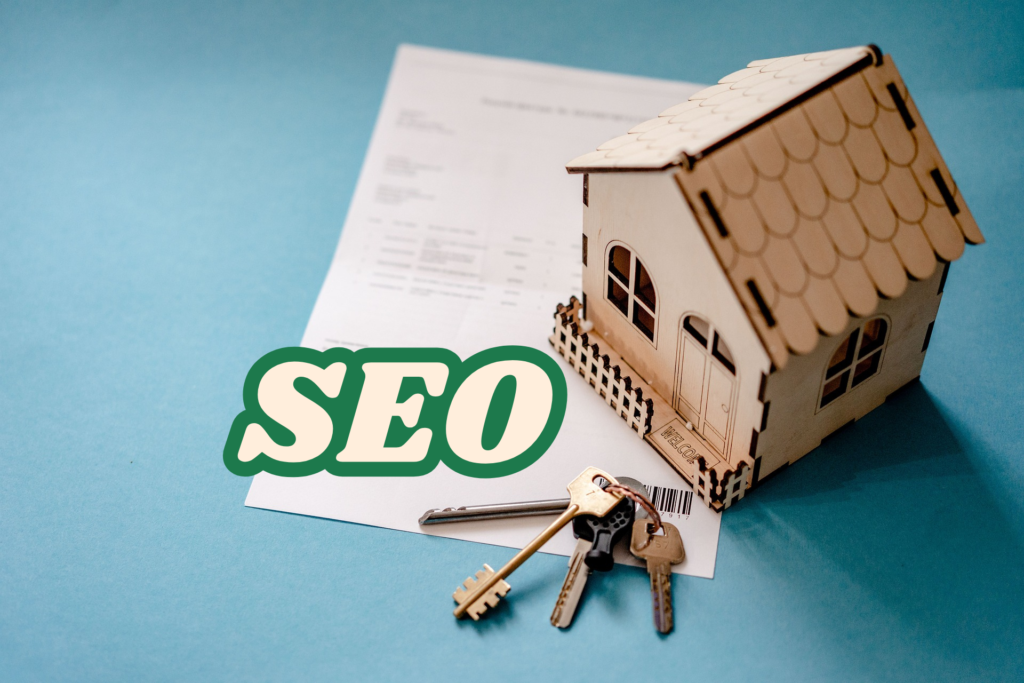Do you need help making an identity for yourself online as a real estate agent? You are not alone, so don’t worry. I’m here to give you all the valuable information you need. Avoid getting outranked by your competitors! Here is the ultimate guide to SEO for real estate to help your company grow to new heights. Let’s dive into the blog and expand your internet visibility right now!
The real estate market has become very competitive in the current digital era, as many buyers and sellers look for properties online and find agents. Because of this change, Search Engine Optimization (SEO) has become a vital tool for real estate agents aiming to make a name for themselves online, increase website traffic, and attract potential clients. Real estate websites can use SEO to raise search engine rankings, pull in targeted traffic, and eventually turn that traffic into leads or customers.

SEO for Real Estate
Defining Real Estate SEO
The process of improving a real estate website to appear higher in search engine results for searches related to agents, property listings, and housing market information is known as real estate SEO. In addition to general SEO, real estate SEO focuses on local search optimisation and targets those looking for information on real estate. It often includes concentrating on high-quality multimedia material, using relevant metadata, and aiming for hyper-local keywords.
Why SEO is Crucial for Real Estate Success
It is challenging to overstate the significance of SEO for real estate companies. Being on the first page of Google’s search results can help you stand out as a real estate agent, broker, or agency. Although there may be a lot of competition in the local real estate market, SEO ensures that potential consumers see your website before seeing a listing from other agents. Whether they are looking for a property in a specific area or a trustworthy representative to represent them, real estate agents can reach clients willing to act by investing in SEO.
SEO for Real Estate: Key Elements to Unlock Your Online Potential
Keyword Research for Real Estate

The foundation of any SEO approach is keyword research. Discovering the keywords that consumers and landlords use for finding properties or agents online is part of real estate SEO. You should aim for:
Local Keywords: Pay particular attention to phrases that contain location-specific identifiers, like “real estate agents in [city]” or “homes for sale in [city/neighbourhood].”
Transactional keywords: Are those that suggest a user’s intention to buy something or do something, for example, “list my property with an agent” or “buy a property in [location]”.
Informational keywords: Are phrases like “how to buy a home” or “first-time home buyer tips”, which lead potential customers to helpful information.
You can identify high-traffic keywords that are relevant to your market and target audience by using tools like Google Keyword Planner, Ahrefs, Semrush, Moz and Keyword Finder etc..
Local SEO for Real Estate
Since most clients search for properties or agents in specific locations, local SEO is the most critical aspect of real estate SEO. To appear in local search results, real estate agents need to:
- Claim and improve their Google My Business (GMB) profile by including client testimonials, business hours, and updated contact details
- Integrate location-specific keywords into page content, meta descriptions, and titles
- List the business in local directories such as Google and the Yellow Pages to improve visibility and trust
In instance, a well maintained Google My Business page makes the company more visible in Google’s Local Pack, improving your chances of connecting with local clients looking for services in their area.
On-Page SEO for Real Estate Websites

Optimizing individual pages on your website is known as on-page SEO. In order to optimize the on-page elements of your website for real estate, make sure that:
Meta descriptions and title tags are specific to the property or service and optimized for keywords.
Headings (H1, H2, etc.) are organized correctly for readability and include appropriate keywords.
The descriptions of the properties are interesting and informative. Describe each property’s qualities, surrounding area, and way of life.
Additionally, since search engines prefer websites that offer users value, make sure the content is interesting and informative.
Off-Page SEO : Building Authority

It is crucial to use off-page SEO to build a solid online presence. Search engines become aware of the trustworthiness of your website via backlinks from trusted websites. Among the strategies used to increase authority are:
- Working with nearby businesses or real estate websites to be included in their listings or articles.
- Social media presence is another aspect of off-page SEO that indirectly affects your SEO by boosting brand awareness and bringing in organic customers.
Creating SEO-Friendly Content for Real Estate
Blogging and Content Marketing in Real Estate
Real Estate agents need to know :
By offering clients more relevant information and establishing you as an authority, a well-maintained blog can significantly boost your real estate SEO. Suggested blog topics include:
- Industry news and analysis.
- Advice on purchasing, leasing, or selling real estate.
- Community spotlights and local community guides.
- In addition to attracting visitors, this type of content keeps them interested and motivates them to stay on your website longer, which improves SEO.
SEO-Optimized Property Listings
The main focus of every real estate website is the listing of properties. The following are some ways to optimize these listings:
- Integrating appropriate keywords into alt tags, descriptions, and titles
- Creating unique and detailed property descriptions will help you avoid duplicate content penalties
- Including virtual tours and excellent photos with appropriately structured file names and alt text
- Good real estate listings enhance visibility and improve the site’s appeal to potential customers, generating more leads
Using Visual Content for Better Engagement
When analyzing properties, real estate purchasers depend significantly on images. To maximize the impact of visuals for SEO:
- To help search engines understand the content of each image, use alt text.
- Integrate virtual tours or motion pictures to increase user engagement.
- Reduce the size of image files to ensure quick loading times.
- High-quality multimedia content indicates value to search engines and helps keep visitors on your site longer.
Technical SEO for Real Estate Websites

Mobile Optimization
Considering that smartphone searches are becoming more frequent than desktop searches, a mobile-friendly website is essential.
- One aspect of mobile optimization is ensuring that the website adapts to various screen sizes because of its flexible design
- It is easier to use on mobile devices thanks to an improved interface
- Images of properties and tours load quickly without compromising quality
Because individuals frequently search on their phones, mobile optimization is crucial in the real estate sector.
Website Speed and Performance
In addition to improving user experience, a website that loads quickly affects SEO rankings. Utilize resources such as Google PageSpeed Insights to assess and enhance the speed of your website by:
- Reducing the size of pictures and other media assets
- Reducing lower on HTTP requests and improving code
- Turning on browser caching
Conclusion
Thank you for reading my blog!I can help you whether you’re a buyer, seller, or just an interested homeowner. Please join our community now to get the most recent information, advice, and inside insights into the real estate industry. To get in touch with us and achieve your real estate goals, visit our website and follow us on social media!
